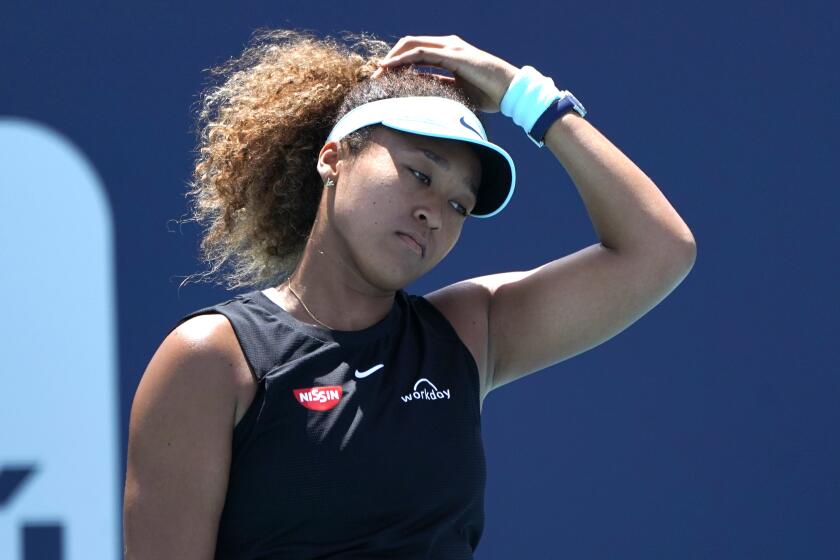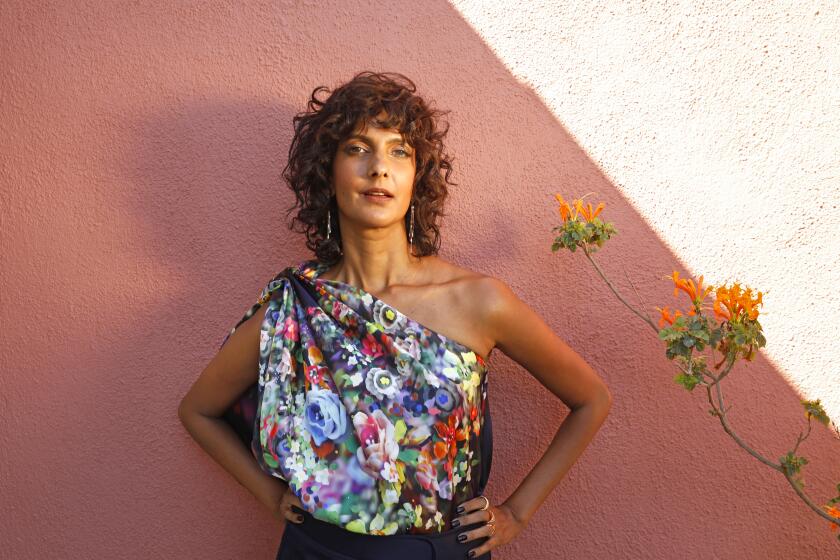Naomi Osaka chose her mental health over tennis. Netflix’s new doc helps explain why
- Share via
If you don’t follow sports, you may have become aware of Naomi Osaka, as I did, not for her playing but for her not playing.
Last month, the 23-year-old, who’s currently ranked No. 2 in women’s tennis, withdrew from the French Open because she did not want to participate in news conferences. Osaka then pulled out of Wimbledon to take “some personal time with friends and family” in advance of the Tokyo Olympics, where she’s representing Japan. Last year, she announced that she wouldn’t compete in the semifinals of the Western & Southern Open after the police shooting of Jacob Blake in Kenosha, Wis., which basically stopped tennis for a day.
If anything, these decisions have only strengthened her brand; her fans understand that she is superhuman only on the court; her sponsors, who have stuck by her, understand that her fans understand this. Earlier this month, she was named best athlete in women’s sports at the ESPYS, and she is on the Olympic-themed July 19 cover of Time magazine, over the quote “It’s O.K. to Not Be O.K.” A limited-edition Osaka “Role Model” Barbie, released Monday, sold out in two days.
L.A. Times columnists Helene Elliott, LZ Granderson, Dylan Hernández and Bill Plaschke discuss Naomi Osaka, the role of media, athletes’ mental health and more.
“Naomi Osaka” is the pointedly simple title of a disarming, compact docuseries premiering Friday on Netflix. Directed by Garrett Bradley (the Oscar-nominated “Time”) across 2019 and 2020, the docuseries could be called a portrait, its approach less informational than artistic. At the same time, out of its artfully quilted bits and pieces, its searching closeups and surrounding details, it leaves you feeling that you have come to know its subject, rather than merely know about her. In its mix of private and public spaces, scenes of preparation and performance, it’s a little reminiscent of Madonna’s “Truth or Dare,” though where the Queen of Pop is clearly steering that ship, Osaka is more of a passenger here.
At something like 111 minutes, split over three episodes, it is short by the current standard for streaming docuseries, when anything less than four hours can seem like an insult both to the subject and the viewer. But it is as long as it needs to be, and dividing what is essentially a feature film into three episodes makes it television and gives it a structure — three acts in which she wins, doesn’t win and wins again — that is helpful, given an otherwise free-associating narrative that also takes in Osaka’s adventures in fashion and activism.
Tennis notwithstanding, its pace is unusually meditative for a sports documentary. Osaka is famously shy and so soft-spoken that it is sometimes hard to hear her. (This is at times the fault, in the version I saw, of mixing the score too high.) But her message gets across, nevertheless, and Bradley does a good job of massaging a variety of worse and better audiovisual sources into an aesthetic whole, with a soft, pastel palette, that gives the film something of the aspect of an art object, a vessel that contains Naomi Osaka. (More than once she describes herself as a vessel — indeed, it’s the first thing we hear her say — for tennis and “everyone’s hard work.”)
The frame is sometimes canted, as if the photographer were shooting surreptitiously — this may well have been the case, in certain instances — or for what seems like not strictly necessary visual excitement. Much of it is shot with long lenses, through doors and over shoulders, as if the camera were spying or at least staying helpfully out of the way. This audiovisual eavesdropping makes events seem intimate, even when they’re happening far off. Osaka herself contributes some self-shot video diaries. In one, she walks a city after a loss, “headed towards no direction,” narrating her progress as if she were leaving a record the police might need in the morning: “It’s either walk or don’t sleep and lose my mind, ’cause it’s for sure I’m not going to sleep.”
After defying stereotype in small, potent roles in “The Night Of,” “Ramy” and more, the actor finds her biggest platform yet in Netflix’s “Never Have I Ever.”
Osaka may be a highly developed tennis player, but like most people her age, she is also a work in progress, off and on the court, and it’s this that makes “Naomi Osaka” worth watching. Nowadays, when a public figure grants access to a filmmaker, it is most often in the service of a promotional strategy, rather than a collaborative attempt to arrive at some sort of truth. I suppose, in that Osaka comes across as a sympathetic character, “Naomi Osaka” might be regarded as a kind of advertisement. (It certainly made me like her.) But if honesty and vulnerability are the heart of your brand, even more than the power of your serve, you are by definition going to get some interesting results, and Osaka seems to want to surrender to, rather than control, the process. (She is not listed among the series’ executive producers, though LeBron James is.)
Obviously, it’s possible that away from the cameras, Osaka might act up and act out and stomp her feet and hold her breath until she turns blue; abuse her team or lash out at clerks and waiters. Coaches and trainers do come and go mysteriously, but nothing on camera would lead one to believe her a diva or such a deft actress that she could so successfully misrepresent herself. If anything, Osaka seems extraordinarily available — she answers reporters’ questions thoughtfully and seriously, candid about what she perceives as her imperfections. It is just this underlining of self-doubt, reportedly, that made her want to avoid news conferences at the French Open.
Pressure is relative, to be sure: You can feel it working in a grocery store or writing television reviews or trying to raise kids right as certainly as you can on a tennis court or arena stage before a crowd of thousands, and feel that you are at the very limit of human endurance. At the same time, because virtuosos like Osaka make things look easy, we can minimize the pressure on them, and because we feel a certain sense of ownership when it comes to public performers, whether they’re athletes or musicians or whatever, we feel quite free to criticize their missed shots and flubbed notes, as if we took them personally or know what their trouble is or could do better.
Osaka doesn’t need anyone to judge her. She takes care of that herself quite capably. She worries about letting down her parents, her coach, Kobe Bryant (a friend who gave her “real life advice”). She reflects on “this build-up of things I want to say but I’m super scared,” though she will ultimately take part in Black Lives Matter protests and come to the 2020 U.S. Open with face masks bearing the names of Black victims of police violence. She is so concerned for 15-year-old Coco Gauff that after beating her in the third round of the 2019 U.S. Open, she invites her to do the courtside postmortem together. And Osaka, who was born in Japan to a Japanese mother and a Haitian father and grew up in the U.S., worries that she’s not adequately representing “half Black, half Japanese kids.” “This guy from Haiti somehow met this woman from Japan,” she muses, “and they had this dream of having kids that played tennis.” (Older sister Mari, who also played professionally, retired earlier this year.)
“For so long, I’ve tied winning to my worth as a person,” Osaka says. “What am I if not a good tennis player?” She wonders about the normal life she might have missed — “I’m not aware of the timeline, but I think that people my age are in college now?” — but says, “I feel like I’m too far down this path to wonder what could have been.” Those are the last words she speaks in the series, as the camera settles on her face, far from a tennis court, on a boat at sea.
‘Naomi Osaka’
Where: Netflix
When: Any time, starting Friday
More to Read
The complete guide to home viewing
Get Screen Gab for everything about the TV shows and streaming movies everyone’s talking about.
You may occasionally receive promotional content from the Los Angeles Times.









